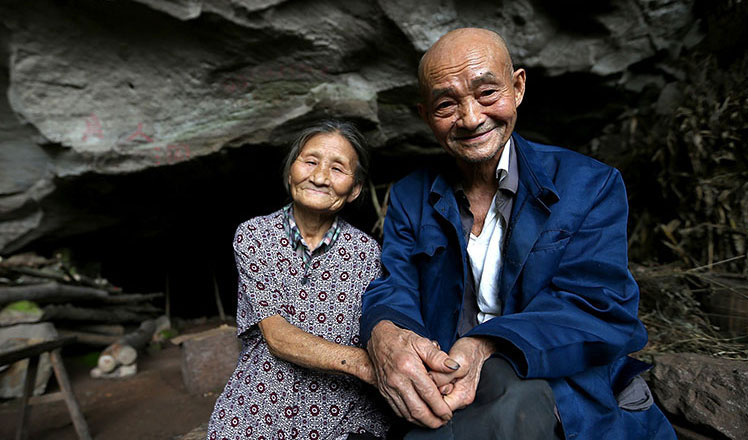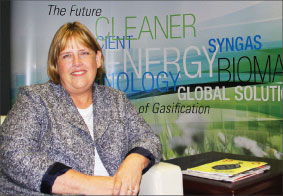US gasification technology thrives in China
Updated: 2016-09-08 11:26
By May Zhou in Houston(China Daily USA)
|
||||||||
|
DeLome Fair, president and CEO at Synthesis Energy Systems, Inc., talks about the company's success in China. May Zhou / China Daily |
When Gas Technology Institute (GTI), a non-profit research facility based in Chicago, began to develop the gasification technology for low-rank quality coal, it was part of the energy security strategy of the US Department of Energy.
Decades later, the developed technology, which turns low-quality coal into clean gas, found its first commercial application not in the US but China, through Houston-based Synthesis Energy Systems, Inc. (SES).
"GTI specifically developed gasification technology for coal with the initial research beginning in the 1970s. It was an alternative to gas which was believed to be scarce and expensive at that time," said DeLome Fair, president and CEO at SES.
SES was formed in 2004 with the intention of commercializing the GTI technology, which was adopted as SES Gasification Technology (SGT) by the company. The first market the company looked at was China, not the US.
SES considered China to be the best place to commercialize primarily for two reasons, said Fair. "China was already a mature market for coal gasification and very interested in this technology. It has abundant sources of coal but lacks in gas and oil. Its economy is growing very quickly and needs a lot of gas products.
Initially SES was also looking at opportunities in the US when coal projects were still under consideration. However, the 2008 financial crisis stopped a couple of coal projects. By the time the financial situation improved, natural gas was abundant and cheap due to new shale gas extracting technology. Coal is not needed in the US, at least for now.
SES turned their focus on China, where more than 60 percent of energy consumption comes from coal, to commercialize SGT. It formed joint ventures and worked with various Chinese companies including the Aluminum Corporation of China.
SES first licensed its SGT to Chinese companies for commercialization. After seeing how economically successful the plants were, it decided to be an investor too. This year, it signed an agreement with China Environment State Investment Company to jointly develop, invest and build 20 projects. Two new projects in the industrial park in Dongying, Shandong were recently announced from this agreement.
Having gained a foothold in the Chinese market, SES now hopes to expand beyond China. It has signed an agreement with China Coal Research Institute (CCRI) with the intention of jointly developing projects internationally using SGT.
"We are eager to expand in and beyond China and we are leveraging our Chinese ties to do that. Many countries associated with One Belt One Road have abundant resources of low-rank coal and limited access to affordable natural gas. Our connection with China gives us a strong base to expand to the rest of the world," said Fair.
The biggest challenge for Fair to do business in China is the different approach to contracts.
"The Chinese think we are very bureaucratic. ... Chinese people are more about relationships and faces. Shaking hands is as good as a contract in a lot of cases. Finding a balance between the two is an interesting process," said Fair.
Different business styles aside, China is an exciting place to do business, said Fair. "It's a fun place because decisions are made quickly and the strategy of the government is very apparent. It's easy to see where SES fits in the strategy of the Chinese government," said Fair.
mayzhou@chinadailyusa.com
- Joint ASEAN humanitarian drill 'improves mutual trust'
- DPRK's nuclear test condemned for cranking up tensions
- The world in photos: Sept 4 - 11
- Woman in iconic V-J Day kiss photo dies at 92
- Three women planning 'imminent' attacks arrested in France: minister
- China, Britain vow to deepen military exchanges, mutual trust

 US marks 15th anniversary of 9/11 attacks
US marks 15th anniversary of 9/11 attacks
 Beautiful, smart robots shine at expo in Nanjing
Beautiful, smart robots shine at expo in Nanjing
 In pics: Top 10 most global cities in 2016
In pics: Top 10 most global cities in 2016
 In pics: Couple living in a cave for 54 years
In pics: Couple living in a cave for 54 years
 Back basket: New money-making tool in scenic spot
Back basket: New money-making tool in scenic spot
 Legless man and boy climb a mountain together
Legless man and boy climb a mountain together
 15th anniversary of 9/11 attacks marked
15th anniversary of 9/11 attacks marked
 Yao Ming and Class of 2016 receive Hall of Fame jackets
Yao Ming and Class of 2016 receive Hall of Fame jackets
Most Viewed
Editor's Picks

|

|

|

|

|

|
Today's Top News
Trump outlines anti-terror plan, proposing extreme vetting for immigrants
Phelps puts spotlight on cupping
US launches airstrikes against IS targets in Libya's Sirte
Ministry slams US-Korean THAAD deployment
Two police officers shot at protest in Dallas
Abe's blame game reveals his policies failing to get results
Ending wildlife trafficking must be policy priority in Asia
Effects of supply-side reform take time to be seen
US Weekly

|

|










